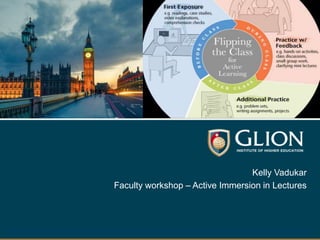
Active Immersion in Lectures
- 1. Kelly Vadukar Faculty workshop – Active Immersion in Lectures
- 2. SESSION OUTCOMES The background Theatre in classrooms: Experiential learning Example and sharing of ideas A theoretical approach Over to you….
- 3. THE BACKGROUND + Services have been widely described as 'performances' (Berry, Zeithaml and Parasuraman, 1985) and, for some time now, a number of services marketing scholars and practitioners have recognised and identified various aspects of the service encounter as theatrical in nature (Grove and Fisk, 2007). + Those who deliver services have been characterised as 'actors' or 'cast members' (Berry, 1981; Grove, Fisk and Bitner, 1996) whose role enactments help define service excellence (Solomon et al., 1985). + This has led to the emergence of so-called arts-based forms of training such as theatre-based trainings and improvisational theatre exercises which help to develop presentational and performance skills needed in the service industry (Finsterwalder and O’Steen, 2008). The literature suggests that hotel school students might benefit from similar exercises, due to their roles and responsibilities.
- 4. THUS..
- 6. BORING – NOT USED - OUTDATED
- 7. THEATRE IN THE CLASSROOM + Theatrics methods as teaching approaches are underpinned by students being involved in constructing their own knowledge + This is (Savery and Duffy, 1995), where students take ownership of a learning activity, and work with real-life problems through which they develop work knowledge and skills through the collaborative efforts of the group to identify and resolve issues + Therefore the active role of students in PBL implies that students have to plan and monitor their learning processes, and take responsibility for their own learning and development (Hmelo-Silver, 2004; Van den Hurk, 1998) This may well be through improvisation and an assimilation of one’s past experiences.
- 9. EXPERIENTIAL LEARNING = PERFORMANCE MODEL + Approaches associated with experiential learning include the use of games, simulations, role plays, visits and practical work (Gibbs, 1992) + With experiential learning there is a desire to develop the person and their capabilities, and to offer a form of learning that emphasise what people can do rather than what they know (Graves, 1993)
- 10. THE NUMBERS
- 12. IT IS MORE ABOUT ENGAGING STUDENTS RATHER THAN ENTERTAINING STUDENTS.
- 13. SO WHAT CAN WE DO?
- 14. EXAMPLES
- 15. EVENTS: UG: S1 WOHT, S4 MARKETING AND MBA: TOURISM (LINKED TO PROJECTS)
- 16. S6: MARKETING AND COMMUNICATION (LIVE PROJECT)
- 17. S4: MARKETING ESSENTIAL: CONFERENCE POSTER NPD (PROJECT)
- 18. PG: CUSTOMER SERVICE: MONICA OR (GUEST SPEAKER)
- 19. S6: ORGANISATIONAL BEHAVIOUR: KEEP CALM AND RELEASE STRESS (STUDENT LED/RUN EVENT)
- 20. S6: ORGANISATIONAL BEHAVIOUR: HUMAN KNOT – TEAM AND COMMUNICATION (CLASS ACTIVITY)
- 21. S6: ORGANISATIONAL BEHAVIOUR: TEAMS (CLASS ACTIVITY)
- 22. S4: ENTREPRENEURIAL MANAGEMENT: PITCH TO AN ENTREPRENEUR (CLASS ACTIVITY/GUEST SPEAKER)
- 23. PG: PRINCIPLES OF MARKETING: MOOD BOARD (CLASS ACTIVITY)
- 24. ACTIVE ENGAGEMENT IN LEARNING
- 25. BUT
- 26. I HAVE.. + Limited time + Big numbers + So many learning outcomes to cover + Students unwilling participate + A small classroom + Too much content to deliver + Students only interested in exams and passing them
- 27. WHAT WE COULD DO IS…
- 29. PRACTICE
- 30. Thank you.
- 31. REFERENCES + Gibbs, G. 1992. Improving the quality of student learning. Technical and Educational Service Ltd: Bristol + Kolb, D.A. 1984. Experiential Learning. Englewood Cliffs, NJ: Prentice-Hall + Savery, J. and Duffy, T. (1995). Problem-based learning: An instructional model and its constructivist framework, in Wilson, B. (Ed.), Constructivist learning environments: Case studies in instructional design, pp. 135-148. Englewood Cliffs, NJ: Educational Technology Publications + Hmelo-Silver, C. E. (2004). “Problem-based learning: What and how do students learn? “ Educational Psychology Review, Vol,16, pp. 235–266 + Finsterwalder, J. and O’Steen, B. (2008). “Marketing Theatre Education: Using Improvisation for Teaching and Learning”, Sydney, Australia: ANZMAC 2008, 1-3 Dec 2008. Proceedings of the ANZMAC Conference. Available online: http://ir.canterbury.ac.nz/handle/10092/2502 [Accessed: 1.8.2009] + Fisk, R.P. Gountas, S., Hume, M., Gountas, J., Grove, S.J. and John, J. (2007).Services Marketing, 1st Asia-Pacific ed., Milton, QLD: Wiley
Hinweis der Redaktion
- http://plpnetwork.com/2015/03/10/shift-active-learning-technology-answer/
